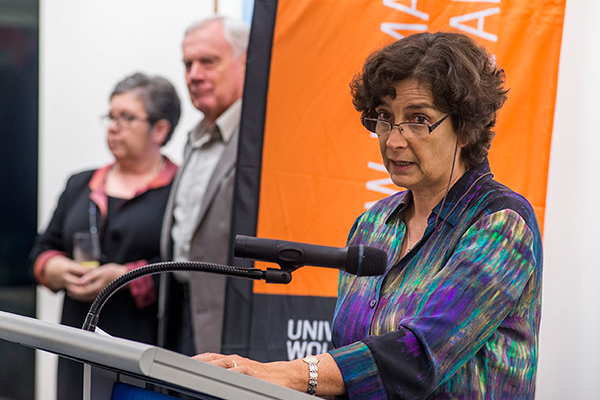April 9, 2014
Academic investigates how medical history informs today's decisions
How influential has the Nazi analogy been in recent medical debates on euthanasia? Is the history of eugenics being revived in modern genetic technologies? And what does the tragic history of thalidomide and its recent reintroduction for new medical treatments tell us about how governments solve ethical dilemmas?
These are among topical issues of importance to researchers from the humanities and medical sciences, addressed in a new book, which was launched at the University of Wollongong (UOW) Library on 8 April, entitled Bioethics in Historical Perspective.
Its author is Associate Professor Sarah Ferber who researches in two fields of cultural history – early modern European religion and contemporary bioethics. She is also Chair of the UOW and Health District Human Research Ethics Committee (Health and Medical).
The book highlights that in modern ‘culture wars’, bioethics is a political minefield. How does the involvement of medical industries affect research directions, for example? And how important are religion and the abortion debate for modern medical ethics?
As the book notes: “Because bioethics by its very nature leaps across cultural divides – from legislature into the clinic, from the seminary into the courtroom, from the lecture theatre into the late news bulletin, from the deathbed onto the web – the starting points of academics involved in bioethics commentary are possibly more than usually exposed to public view.”
Professor Ferber said Bioethics in Historical Perspective shows how our understanding of medical history still plays a part in clinical medicine and medical research today.
The new book, published by Palgrave MacMillan, presents an extensively documented set of case studies in biomedical ethics exploring the important role played by history in thinking about modern medical practice and policy.
The book provides up-to-date information about issues in bioethics as well as a guide to the most influential ethical standpoints.
Bioethics in Historical Perspective was launched by historian and ARC Future Fellow Professor Vera Mackie of UOW’s School of Humanities and Social Inquiry. MC for the launch was Professor Colin Thomson from UOW’s School of Medicine who is a major figure in Australian medical research ethics having chaired the Australian Health Ethics Committee of the National Health and Medical Research Council (NHMRC) from 2006-2009.
Professor Mackie commented that Bioethics in Historical Perspective “shows that historical research is vitally important in helping us to understand contemporary social issues”.
“The book should be required reading for medical practitioners, researchers and ethics committee members,” she said.
Professor Thomson said the insights of historians were essential to contemporary and future work in bioethics – “they can show us how ideas and principles we crafted were informed by circumstances that have now disappeared”.
“Those insights inform our need to re-examine and re-locate our use of those ideas in the circumstances that confront us now and will in the future. Professor Ferber’s book is an excellent demonstration of those insights and how they can meet this need,” he said.
Chapters in Bioethics in Historical Perspective focus on bioethics as scholarship; language, narrative and rhetoric in bioethics; euthanasia, the Nazi analogy and the 'slippery slope' argument (such as the case made by opponents of President Barack Obama’s ‘America’s Affordable Health Choices Act of 2009’ who claimed it would lead to a revival of Hitler’s euthanasia killing program); heredity, genes and reproductive politics; human experimentation; and thalidomide. Thalidomide was a drug introduced in 1957 as a sedative and for the treatment of morning sickness which ultimately left 8,000-12,000 children with only partially formed limbs as well as other major health problems. However, researchers have now identified potential new uses for thalidomide and have sought special permission to use it.
Professor Ferber is the previous author of Demonic Possession and Exorcism in Early Modern France and editor, with Sally Wilde, of The Body Divided: Human Beings and Human 'Material' in Modern Medical History.
